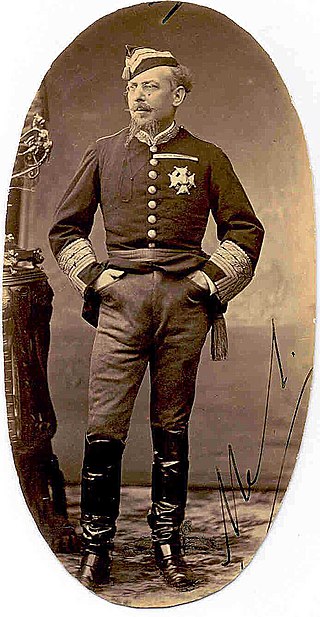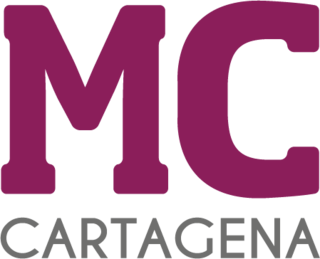
Cartagena, known since the colonial era as Cartagena de Indias, is a city and one of the major ports on the northern coast of Colombia in the Caribbean Coast Region, bordering the Caribbean sea. Cartagena's past role as a link in the route to West Indies provides it with important historical value for world exploration and preservation of heritage from the great commercial maritime routes. As a former Spanish colony, it was a key port for the export of Bolivian silver to Spain and for the import of enslaved Africans under the asiento system. It was defensible against pirate attacks in the Caribbean. The city's strategic location between the Magdalena and Sinú Rivers also gave it easy access to the interior of New Granada and made it a main port for trade between Spain and its overseas empire, establishing its importance by the early 1540s.
The Cerro Maravilla murders, also known as the Cerro Maravilla massacre, occurred on July 25, 1978, at Cerro Maravilla, a mountain in Ponce, Puerto Rico, wherein two young Puerto Rican pro-independence activists, Carlos Enrique Soto-Arriví (1959–1978) and Arnaldo Darío Rosado-Torres (1953–1978), were murdered in a Puerto Rico Police ambush. The event sparked a series of political controversies where, in the end, the police officers were found guilty of murder and several high-ranking local government officials were accused of planning and/or covering up the incident.
A canton is a type of administrative division of a country. In general, cantons are relatively small in terms of area and population when compared with other administrative divisions such as counties, departments, or provinces. Internationally, the most politically important cantons are the Swiss cantons. As the constituents of the Swiss Confederation, theoretically and historically, they are semi-sovereign states.

The New Progressive Party is a political party in Puerto Rico that advocates statehood. The PNP is one of the two major parties in Puerto Rico with significant political strength and currently holds both the seat of the governor and of the resident commissioner.

The Spanish Republic, historiographically referred to as the First Spanish Republic, was the political regime that existed in Spain from 11 February 1873 to 29 December 1874.

Manuel Pavia y Rodriguez de Alburquerque was a Spanish general, born in Cadiz, who was an important part of Spanish political life during the second half of the 19th century. He participated in the Revolution of 1868, which removed Isabella II from power, and led the coup d'état which brought down the First Spanish Republic, giving way to the Restoration and the rule of Isabella's son Alfonso XII.
Cantonalism, mainly prevalent in the late 19th century and early 20th century Spain, is a political option which aims to divide the state into highly autonomous cantons.

The Region of Murcia is an autonomous community of Spain located in the southeastern part of the Iberian Peninsula, on the Mediterranean coast. The region is 11,313 km2 (4,368 sq mi) in area and had a population of 1,511,251 as at the start of 2020. About a third of its population lives in the capital, Murcia, and a seventh in the second city, Cartagena. At 2,014 m (6,608 ft), the region's highest point is Los Obispos Peak in the Massif of Revolcadores.

Jaime Romero Gómez is a Spanish professional footballer who plays as a left winger.

Cartagena Province, also called Gobierno de Cartagena during the Spanish imperial era, was an administrative and territorial division of New Granada in the Viceroyalty of Peru. It was originally organized on February 16, 1533 as a captaincy general from the central portion of the Province of Tierra Firme. In 1717, King Philip V of Spain issued a royal decree creating the Viceroyalty of New Granada, by which the province was added to the latter.

The Cantonal rebellion was a cantonalist insurrection that took place during the First Spanish Republic between July 1873 and January 1874. Its protagonists were the "intransigent" federal Republicans, who wanted to establish immediately the Federal Republic from the bottom-up without waiting for the Constituent Cortes to draft and approve the new Federal Constitution, as defended by the president of the Executive Power of the Republic Francisco Pi y Margall, a Proudhonian Mutualist supported by the "centrist" and "moderate" sectors of the Federal Democratic Republican Party.

Cartagena is a Spanish city and a major naval station on the Mediterranean coast, south-eastern Iberia. As of January 2018, it has a population of 218,943 inhabitants. This makes Cartagena the Murcia region's second-largest municipality and Spain's sixth-largest city that is not a provincial-capital. The wider urban or metropolitan area of Cartagena, known as Campo de Cartagena, has a population of 409,586 inhabitants.
Cartagena is a district of the Santa Cruz canton, in the Guanacaste province of Costa Rica.
The Federal Democratic Republican Party was a Spanish political party founded in 1868 during the Glorious Revolution that was active until 1912. Its ideology was federal republicanism and progressivism.

José López Domínguez, was a Spanish military officer and politician who was prime minister of Spain between 6 July and 30 November 1906.
National Secondary Route 155, or just Route 155 is a National Road Route of Costa Rica, located in the Guanacaste province.
This is the results breakdown of the local elections held in the Region of Murcia on 8 May 1983. The following tables show detailed results in the autonomous community's most populous municipalities, sorted alphabetically.

The Canton of Cartagena, also known as the Canton of Murcia, was a period of Cartagena, Spain's history when it was governed by a radical cantonalist junta for six months between 1873 and 1874. The city rose up in armed insurrection on July 12, 1873 establishing the Canton's de facto independence from the First Spanish Republic and beginning a wave of cantonal rebellions across southern Spain. Loosely inspired by the more well-known Paris Commune two years earlier, the Canton of Cartagena existed during a turbulent revolutionary period of Spanish history known as the Sexenio Democrático.

Movimiento Ciudadano de Cartagena is a regional political party in the region of Murcia, Spain. Its primary strength is located in the city of Cartagena. It advocates for cartagenerism, a social, political and ideological movement in Spain centered in Cartagena, which pursues the right and recognition of an autonomous territory separated from the rest of Murcia that includes this municipality and its region, Campo de Cartagena, which includes the municipalities of La Unión, Los Alcázares, San Javier, San Pedro del Pinatar, Torre Pacheco, Fuente Álamo, some districts in the south of Murcia, such as Lobosillo, as well as Mazarrón ; as well as the defense of the identity of Cartagena and its environment. According to its political program, it also advocates for women's and LGBT rights and environmentalism. The party promotes regional biprovinciality as a way of "not having to identify the entire Region with [the] municipality [of Murcia], enjoy greater autonomy and achieve greater political weight" in the Cortes Generales.
Manuel Cárceles Sabater was a Spanish writer, doctor, politician and one of the protagonists of the Cantonal rebellion of 1873 in Cartagena.











